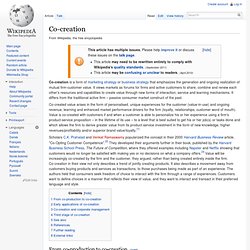

Co-Creation Landscape. Screen-shot-2010-04-17-at-12.58.40-PM.jpg (JPEG-afbeelding, 609x777 pixels) Fronteer Strategy. Co-creation’s five guiding principles. Co-Creation. The participation and involvement of consumers in the creation process formerly dominated by businesses.

"A quick search on Google Scholar confirms the pattern: from only 23 articles citing ‘co-creation’ in the 1970s, the 1980s delivered a paltry 102, the 1990s a more substantial 658, while the first 9 and a bit years of the 21st Century has already spawned an impressive 3,660. " ( Co-creation. Co-creation is a form of marketing strategy or business strategy that emphasizes the generation and ongoing realization of mutual firm-customer value.

It views markets as forums for firms and active customers to share, combine and renew each other's resources and capabilities to create value through new forms of interaction, service and learning mechanisms. It differs from the traditional active firm – passive consumer market construct of the past. Co-created value arises in the form of personalised, unique experiences for the customer (value-in-use) and ongoing revenue, learning and enhanced market performance drivers for the firm (loyalty, relationships, customer word of mouth).